- Home
- V. S. Naipaul
Miguel Street Page 2
Miguel Street Read online
Page 2
She introduced me to the gardener of the big house. He was a good-looking brown man, and he loved his flowers. I liked the gardens he looked after. The flower-beds were always black and wet; and the grass green and damp and always cut. Sometimes he let me water the flower-beds. And he used to gather the cut grass into little bags which he gave me to take home to my mother. Grass was good for the hens.
One day I missed Popo’s wife. She wasn’t waiting for me.
Next morning I didn’t see Popo dipping his finger in the glass of rum on the pavement.
And that evening I didn’t see Popo’s wife.
I found Popo sad in his workshop. He was sitting on a plank and twisting a bit of shaving around his fingers.
Popo said, ‘Your auntie gone, boy.’
‘Where, Mr Popo?’
‘Ha, boy! That’s the question,’ and he pulled himself up there.
Popo found himself then a popular man. The news got around very quickly. And when Eddoes said one day, ‘I wonder what happen to Popo. Like he got no more rum,’ Hat jumped up and almost cuffed him. And then all the men began to gather in Popo’s workshop, and they would talk about cricket and football and pictures – everything except women – just to try to cheer Popo up.
Popo’s workshop no longer sounded with hammering and sawing. The sawdust no longer smelled fresh, and became black, almost like dirt. Popo began drinking a lot, and I didn’t like him when he was drunk. He smelled of rum, and he used to cry and then grow angry and want to beat up everybody. That made him an accepted member of the gang.
Hat said, ‘We was wrong about Popo. He is a man, like any of we.’
Popo liked the new companionship. He was at heart a loquacious man, and always wanted to be friendly with the men of the street and he was always surprised that he was not liked. So it looked as though he had got what he wanted. But Popo was not really happy. The friendship had come a little too late, and he found he didn’t like it as much as he’d expected. Hat tried to get Popo interested in other women, but Popo wasn’t interested.
Popo didn’t think I was too young to be told anything.
‘Boy, when you grow old as me,’ he said once, ‘you find that you don’t care for the things you thought you woulda like if you coulda afford them.’
That was his way of talking, in riddles.
Then one day Popo left us.
Hat said, ‘He don’t have to tell me where he gone. He gone looking for he wife.’
Edward said, ‘Think she going come back with he?’
Hat said, ‘Let we wait and see.’
We didn’t have to wait long. It came out in the papers. Hat said it was just what he expected. Popo had beaten up a man in Arima, the man had taken his wife away. It was the gardener who used to give me bags of grass.
Nothing much happened to Popo. He had to pay a fine, but they let him off otherwise. The magistrate said that Popo had better not molest his wife again.
They made a calypso about Popo that was the rage that year. It was the road-march for the Carnival, and the Andrews Sisters sang it for an American recording company:
A certain carpenter feller went to Arima
Looking for a mopsy called Emelda.
It was a great thing for the street.
At school, I used to say, ‘The carpenter feller was a good, good friend of mine.’
And, at cricket matches, and at the races, Hat used to say, ‘Know him? God, I used to drink with that man night and day. Boy, he could carry his liquor.’
Popo wasn’t the same man when he came back to us. He growled at me when I tried to talk to him, and he drove out Hat and the others when they brought a bottle of rum to the workshop.
Hat said, ‘Woman send that man mad, you hear.’
But the old noises began to be heard once more from Popo’s workshop. He was working hard, and I wondered whether he was still making the thing without a name. But I was too afraid to ask.
He ran an electric light to the workshop and began working in the night-time. Vans stopped outside his house and were always depositing and taking away things. Then Popo began painting his house. He used a bright green, and he painted the roof a bright red. Hat said, ‘The man really mad.’
And added, ‘Like he getting married again.’
Hat wasn’t too far wrong. One day, about two weeks later, Popo returned, and he brought a woman with him. It was his wife. My auntie.
‘You see the sort of thing woman is,’ Hat commented. ‘You see the sort of thing they like. Not the man. But the new house paint up, and all the new furniture inside it. I bet you if the man in Arima had a new house and new furnitures, she wouldnta come back with Popo.’
But I didn’t mind. I was glad. It was good to see Popo standing outside with his glass of rum in the mornings and dipping his finger into the rum and waving at his friends; and it was good to ask him again, ‘What you making, Mr Popo?’ and to get the old answer, ‘Ha, boy! That’s the question. I making the thing without a name.’
Popo returned very quickly to his old way of living, and he was still devoting his time to making the thing without a name. He had stopped working, and his wife got her job with the same people near my school.
People in the street were almost angry with Popo when his wife came back. They felt that all their sympathy had been mocked and wasted. And again Hat was saying, ‘That blasted Popo too conceited, you hear.’
But this time Popo didn’t mind.
He used to tell me, ‘Boy, go home and pray tonight that you get happy like me.’
What happened afterwards happened so suddenly that we didn’t even know it had happened. Even Hat didn’t know about it until he read it in the papers. Hat always read the papers. He read them from about ten in the morning until about six in the evening.
Hat shouted out, ‘But what is this I seeing?’ and he showed us the headlines: CALYPSO CARPENTER JAILED.
It was a fantastic story. Popo had been stealing things left and right. All the new furnitures, as Hat called them, hadn’t been made by Popo. He had stolen things and simply remodelled them. He had stolen too much, as a matter of fact, and had had to sell the things he didn’t want. That was how he had been caught. And we understand now why the vans were always outside Popo’s house. Even the paint and the brushes with which he had redecorated the house had been stolen.
Hat spoke for all of us when he said, ‘That man too foolish. Why he had to sell what he thief? Just tell me that. Why?’
We agreed it was a stupid thing to do. But we felt deep inside ourselves that Popo was really a man, perhaps a bigger man than any of us.
And as for my auntie …
Hat said, ‘How much jail he get? A year? With three months off for good behaviour, that’s nine months in all. And I give she three months good behaviour too. And after that, it ain’t going have no more Emelda in Miguel Street, you hear.’
But Emelda never left Miguel Street. She not only kept her job as cook, but she started taking in washing and ironing as well. No one in the street felt sorry that Popo had gone to jail because of the shame; after all, that was a thing that could happen to any of us. They felt sorry only that Emelda was going to be left alone for so long.
He came back as a hero. He was one of the boys. He was a better man than either Hat or Bogart.
But for me, he had changed. And the change made me sad.
For Popo began working.
He began making Morris chairs and tables and wardrobes for people.
And when I asked him, ‘Mr Popo, when you going start making the thing without a name again?’ he growled at me.
‘You too troublesome,’ he said. ‘Go away quick, before I lay my hand on you.’
III
GEORGE AND THE PINK HOUSE
I was much more afraid of George than I was of Big Foot, although Big Foot was the biggest and the strongest man in the street. George was short and fat. He had a grey-moustache and a big belly. He looked harmless enough but he was always mutter
ing to himself and cursing and I never tried to become friendly with him.
He was like the donkey he had tied in the front of his yard, grey and old and silent except when it brayed loudly. You felt that George was never really in touch with what was going on around him all the time, and I found it strange that no one should have said that George was mad, while everybody said that Man-man, whom I liked, was mad.
George’s house also made me feel afraid. It was a broken-down wooden building, painted pink on the outside, and the galvanised-iron roof was brown from rust. One door, the one to the right, was always left open. The inside walls had never been painted, and were grey and black with age. There was a dirty bed in one corner and in another there was a table and a stool. That was all. No curtains, no pictures on the wall. And even Bogart had a picture of Lauren Bacali in his room.
I found it hard to believe that George had a wife and a son and a daughter.
Like Popo, George was happy to let his wife do all the work in the house and the yard. They kept cows, and again I hated George for that. Because the water from his pens made the gutters stink, and when we were playing cricket on the pavement the ball often got wet in the gutter. Boyee and Errol used to wet the ball deliberately in the stinking gutter. They wanted to make it shoot.
George’s wife was never a proper person. I always thought of her just as George’s wife, and that was all. And I always thought, too, that George’s wife was nearly always in the cow-pen.
And while George sat on the front concrete step outside the open door of his house, his wife was busy.
George never became one of the gang in Miguel Street. He didn’t seem to mind. He had his wife and his daughter and his son. He beat them all. And when the boy Elias grew too big, George beat his daughter and his wife more than ever. The blows didn’t appear to do the mother any good. She just grew thinner and thinner; but the daughter, Dolly, thrived on it. She grew fatter and fatter, and giggled more and more every year. Elias, the son, grew more and more stern, but he never spoke a hard word to his father.
Hat said, ‘That boy Elias have too much good mind.’
One day Bogart, of all people, said, ‘Ha! I mad to break old George tail up, you hear.’
And the few times when Elias joined the crowd, Hat would say, ‘Boy, I too sorry for you. Why you don’t fix the old man up good?’
Elias would say, ‘It is all God work.’
Elias was only fourteen or so at the time. But that was the sort of boy he was. He was serious and he had big ambitions.
I began to be terrified of George, particularly when he bought two great Alsatian dogs and tied them to pickets at the foot of the concrete steps.
Every morning and afternoon when I passed his house, he would say to the dogs, ‘Shook him!’
And the dogs would bound and leap and bark; and I could see their ropes stretched tight and I always felt that the ropes would break at the next leap. Now, when Hat had an Alsatian, he made it like me. And Hat had said to me then, ‘Never fraid dog. Go brave. Don’t run.’
And so I used to walk slowly past George’s house, lengthening out my torture.
I don’t know whether George disliked me personally, or whether he simply had no use for people in general. I never discussed it with the other boys in the street, because I was too ashamed to say I was afraid of barking dogs.
Presently, though, I grew used to the dogs. And even George’s laughter when I passed the house didn’t worry me very much.
One day George was on the pavement as I was passing and I heard him mumbling. I heard him mumble again that afternoon and again the following day. He was saying, ‘Horse-face!’
Sometimes he said, ‘Like it only have horse-face people living in this place.’
Sometimes he said, ‘Short-arse!’
And, ‘But how it have people so short-arse in the world?’
I pretended not to hear, of course, but after a week or so I was almost in tears whenever George mumbled these things.
One evening, when we had stopped playing cricket on the pavement because Boyee had hit the ball into Miss Hilton’s yard, and that was a lost ball (it counted six and out) —that evening I asked Elias, ‘But what your father have with me so? Why he does keep on calling me names?’
Hat laughed, and Elias looked a little solemn.
Hat said, ‘What sort of names?’
I said, ‘The fat old man does call me horse-face.’ I couldn’t bring myself to say the other name.
Hat began laughing.
Elias said, ‘Boy, my father is a funny man. But you must forgive him. What he say don’t matter. He old. He have life hard. He not educated like we here. He have a soul just like any of we, too besides.’
And he was so serious that Hat didn’t laugh, and whenever I walked past George’s house I kept on saying to myself, ‘I must forgive him. He ain’t know what he doing.’
And then Elias’s mother died, and had the shabbiest and the saddest and the loneliest funeral Miguel Street had ever seen.
That empty front room became sadder and more frightening for me.
The strange thing was that I felt a little sorry for George. The Miguel Street men held a post-mortem outside Hat’s house. Hat said, ‘He did beat she too bad.’
Bogart nodded and drew a circle on the pavement with his right index finger.
Edward said, ‘I think he kill she, you know. Boyee tell me that the evening before she dead he hear George giving the woman licks like fire.’
Hat said, ‘What you think they have doctors and magistrates in this place for? For fun?’
‘But I telling you,’ Edward said. ‘It really true. Boyee wouldn’t lie about a thing like that. The woman dead from blows. I telling you. London can take it; but not George wife.’
Not one of the men said a word for George.
Boyee said something I didn’t expect him to say. He said, ‘The person I really feel sorry for is Dolly. You suppose he going to beat she still? ’
Hat said wisely, ‘Let we wait and see.’
Elias dropped out of our circle.
George was very sad for the first few days after the funeral. He drank a lot of rum and went about crying in the streets, beating his chest and asking everybody to forgive him and to take pity on him, a poor widower.
He kept up the drinking into the following weeks, and he was still running up and down the street, making everyone feel foolish when he asked for forgiveness. ‘My son Elias,’ George used to say, ‘my son Elias forgive me, and he is a educated boy.’
When he came to Hat, Hat said, ‘What happening to your cows? You milking them? You feeding them? You want to kill your cows now too?’
George sold all his cows to Hat.
‘God will say is robbery,’ Hat laughed. ‘I say is a bargain.’ Edward said, ‘It good for George. He beginning to pay for his sins.’
‘Well, I look at it this way,’ Hat said. ‘I give him enough money to remain drunk for two whole months.’
George was away from Miguel Street for a week. During that time we saw more of Dolly. She swept out the front room and begged flowers of the neighbours and put them in the room. She giggled more than ever.
Someone in the street (not me) poisoned the two Alsatians.
We hoped that George had gone away for good.
He did come back, however, still drunk, but no longer crying or helpless, and he had a woman with him. She was a very Indian woman, a little old, but she looked strong enough to handle George.
‘She look like a drinker sheself,’ Hat said.
This woman took control of George’s house, and once more Dolly retreated into the back, where the empty cow-pens were.
We heard stories of beatings and everybody said he was sorry for Dolly and the new woman.
My heart went out to the woman and Dolly. I couldn’t understand how anybody in the world would want to live with George, and I wasn’t surprised when one day, about two weeks later, Popo told me, ‘George new wife leave him,
you ain’t hear?’
Hat said, ‘I wonder what he going do when the money I give him finish.’
We soon saw.
The pink house, almost overnight, became a full and noisy place. There were many women about, talking loudly and not paying too much attention to the way they dressed. And whenever I passed the pink house, these women shouted abusive remarks at me; and some of them did things with their mouths, inviting me to ‘come to mooma.’ And there were not only these new women. Many American soldiers drove up in jeeps, and Miguel Street became full of laughter and shrieks.
Hat said, ‘That man George giving the street a bad name, you know.’
It was as though Miguel Street belonged to these new people. Hat and the rest of the boys were no longer assured of privacy when they sat down to talk things over on the pavement.
But Bogart became friendly with the new people and spent two or three evenings a week with them. He pretended he was disgusted at what he saw, but I didn’t believe him because he was always going back.
‘What happening to Dolly?’ Hat asked him one day.
‘She dey,’ Bogart said, meaning that she was all right.
‘Ah know she dey,’ Hat said. ‘But how she dey? ’
‘Well, she cleaning and cooking.’
‘For everybody?’
‘Everybody.’
Elias had a room of his own which he never left whenever he came home. He ate his meals outside. He was trying to study for some important exam. He had lost interest in his family, Bogart said, or rather, implied.
George was still drinking a lot; but he was prospering. He was wearing a suit now, and a tie.
Hat said, ‘He must be making a lot of money, if he have to bribe all the policemen and them.’
What I couldn’t understand at all, though, was the way these new women behaved to George. They all appeared to like him as well as respect him. And George wasn’t attempting to be nice in return either. He remained himself.
One day he said to everyone, ‘Dolly ain’t have no mooma now. I have to be father and mother to the child. And I say is high time Dolly get married.’

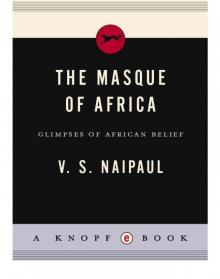 The Masque of Africa: Glimpses of African Belief
The Masque of Africa: Glimpses of African Belief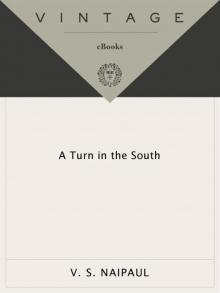 A Turn in the South
A Turn in the South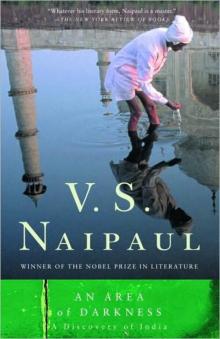 An Area of Darkness
An Area of Darkness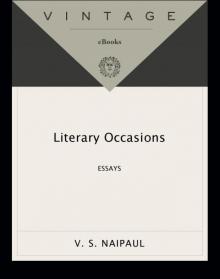 Literary Occasions: Essays
Literary Occasions: Essays A Way in the World
A Way in the World Among the Believers: An Islamic Journey
Among the Believers: An Islamic Journey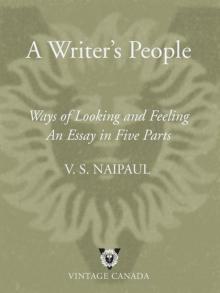 A Writer's People: Ways of Looking and Feeling
A Writer's People: Ways of Looking and Feeling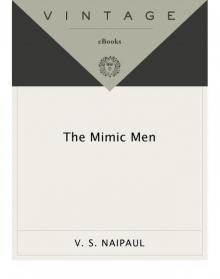 The Mimic Men: A Novel
The Mimic Men: A Novel Collected Short Fiction
Collected Short Fiction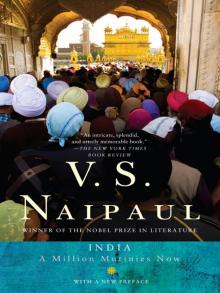 India: A Million Mutinies Now
India: A Million Mutinies Now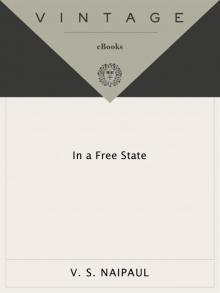 In a Free State
In a Free State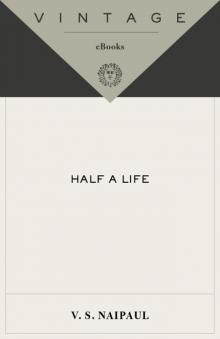 Half a Life
Half a Life Beyond Belief: Islamic Excursions Among the Converted Peoples
Beyond Belief: Islamic Excursions Among the Converted Peoples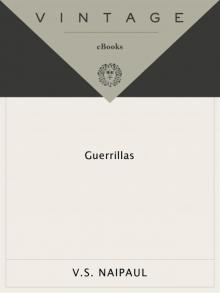 Guerrillas
Guerrillas A House for Mr. Biswas
A House for Mr. Biswas The Writer and the World: Essays
The Writer and the World: Essays Magic Seeds
Magic Seeds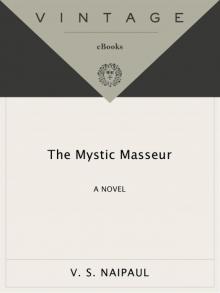 The Mystic Masseur
The Mystic Masseur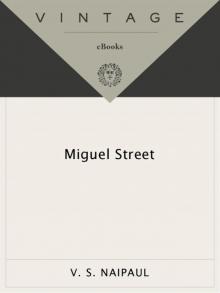 Miguel Street
Miguel Street The Return of Eva Perón, With the Killings in Trinidad
The Return of Eva Perón, With the Killings in Trinidad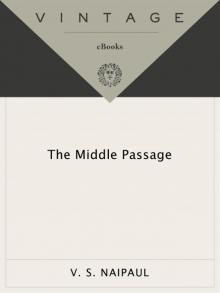 The Middle Passage
The Middle Passage A Bend in the River
A Bend in the River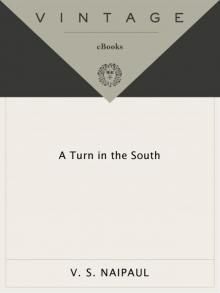 A Turn in the South (Vintage International)
A Turn in the South (Vintage International) Among the Believers
Among the Believers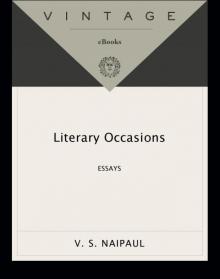 Literary Occasions
Literary Occasions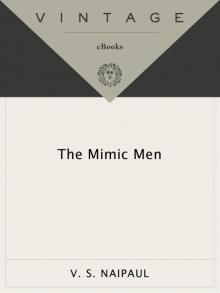 The Mimic Men
The Mimic Men The Writer and the World
The Writer and the World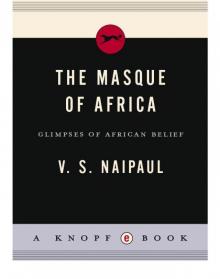 The Masque of Africa
The Masque of Africa